- Home
- Clive Barker
Mister B. Gone Page 7
Mister B. Gone Read online
Page 7
So, now you know how I came to walk the earth. It’s not a pleasant story. But every word of it is true.
So now are you satisfied? Have you had enough confessions out of me? I’ve admitted to patricides. I’ve told you how I fell in love, and how quickly and tragically my dreams of Caroline’s adoration were snatched from me. And I’ve told you how I kept myself from killing off the Archbishop’s daughter, though I’m sure most of my kind would have slaughtered her on the spot.
They would have been right to do so, as it turned out. But you don’t need to hear that. I’ve told you enough. Nor do you need to hear about the Archbishop and the bonfires on Joshua’s Field. Believe me, it wouldn’t please you. Why not? Because it’s a very unflattering picture of your kind.
On the other hand . . . maybe that’s exactly why I should tell you. Yes, why not? You’ve obliged me to uncover the flaws in my soul. Maybe you should hear the naked truth about your own people. And before you protest and tell me that I’m talking about distant days, when your species was far cruder and crueler than it is now, think.
Consider how many genocides are under way as you sit reading this, how many villages, tribes, even nations, are being erased. Good. So listen and I’ll tell you about the glorious horrors of Joshua’s Field. This one’s on me.
As I descended the slope, I took in the vista below. There were hundreds of people assembled for the eight o’clock fire lighting, kept in check by a line of soldiers, their halberds pointed at the crowd so as to slit from navel to neck anyone foolish enough to try and get a closer look at the scene. In the large open space the soldiers were guarding a semicircle of woodpiles that had been raised, twice as tall as their builders. The three woodpiles in the center of the crescent were distinguished by having inverted wooden crosses raised above them.
Facing this grim array were two viewing stands. The larger of the two was a simple construction resembling a flight of deep, tall stairs, which was already almost full of God-fearing lords and ladies who had no doubt paid well for the privilege of watching the executions in such comfort. The other construction was very much smaller, and draped and canopied with lush red velvet, to protect those who would be seated inside from wind or rain. A large cross was raised above the canopy in case anyone would be in doubt that this was where the new Archbishop and his entourage would be seated.
Once I got down to the base of the slope, however, my own view was entirely blocked. Why? Because though it irks me to admit it, I was shorter than the peasants all around me. It wasn’t only my vision that was besieged; so was my sense of smell. I was pressed upon from all sides by filthy, flea-infested bodies, whose breath was sickening and whose flatulence, its source of which I was regrettably closer than most, barely short of toxic.
Panic seized me, like a snake weaving its way up my spine from bowels to brain, turning my thoughts to excrement.
I began to flail wildly and the sound my mother made in the depths of her nightmares escaped me, as shrill as a spitted baby.
It opened cracks in the mud beneath me.
My noise inevitably drew the unwelcome attention of those in my vicinity who knew where it had issued from. People retreated from me on every side. Their eyes, in which I had until now only seen the dull luster of ignorance and inbreeding, now gleamed with a superstitious horror.
“Look, the earth cracks beneath his feet!” one woman yowled.
“His feet! God in heaven, look at his feet!” another yelled.
Though the mud had done something to disguise my feet, it wasn’t enough to conceal the truth.
“It’s not human!”
“Hell! It’s from Hell!”
A frenzy of terror immediately seized hold of the crowd.
While the woman who’d begun this furor shrieked the same few words over and over —“A demon! A demon! A demon!” —
others began to gabble prayers, crossing themselves in a desperate attempt to protect themselves from me.
I took advantage of their terrified state and deliberately unleashed another of Momma’s Nightmare Cries, one so loud that blood ran copiously from the ears of many of those around me. I seized the opportunity to run, deliberately heading towards the woman who’d begun all this. She was still shrieking A demon! A demon! when I came to her. I caught her by the neck and threw her down into the gaping earth, put my mud-clogged claw on her face to silence her and, yes, smother her at the same time. She had wasted too much salvable breath with her accusations. The life went out of her in less than a minute.
With the job done I drove my way into the crowd, still trailing the last of my ear-popping shriek. The crowd before me parted as I ran. With my head down I had no idea of my direction, but I was certain that if I ran in a more or less straight line I would eventually reach the edge of the crowd, and open ground. Indeed I thought I had done so when the noise of the crowd suddenly diminished. I looked up. The crowd had not disappeared from around me because I had reached its limits but because two soldiers, armoured and helmeted, had arrived and had their halberds pointed directly at me. I slid to a mud-splattered halt a few inches short of their weapons’ points, the last of my Momma’s shriek faltering, then dying into silence.
The larger of the two soldiers, who was easily a foot and a half taller than his companion, lifted up the hinged faceplate on his helmet to see me better. His features were barely less imbecilic than those of the crowd surrounding me. The only light flickering in his gaze was fed by the knowledge that with the one lunge he could run me through and pin me to the ground, allowing the crowd to do their worst.
“What’s your name?” he said.
“Jakabok Botch,” I told him. “And please believe me—”
“Are you a demon?”
There was a burst of accusations from the rabble. I’d murdered an innocent woman, whom I’d cursed into Hell. And I’d made sounds that had left people deaf.
“Shut up, all of you!” the soldier yelled.
The noise diminished, and the soldier repeated his question.
There seemed little point in denying what would be only too apparent if he obliged me to remove my clothes. So I owned up.
“Yes,” I said, raising my arms as though in surrender. “I am a demon. But I’m here because I was tricked.”
“Oh, the pity of it,” the soldier said. “The poor little devil was tricked.”
He poked me with the point of his halberd, aiming for the bloody stain where the original owner of these clothes had stabbed me. It was only a minor wound, but the soldier’s prodding made it bleed afresh. I refused to let out a single sound of complaint. I knew from overhearing the idle chatter of Pappy G.’s torturer friends that nothing satisfied them more than to hear the shrieks and pleas of those whose nerve endings were beneath their gouges and brands.
The only problem with my silence was that it inspired the soldier to further invention in pursuit of some response. He pushed the halberd’s blade still deeper, turning it as he did so.
The flow of blood increased considerably, but I still refused to give voice to a single plea in pursuit of mercy.
Again, the soldier dug and twisted; again there was an issuing of blood; again I remained silent. By now my body had started to shake violently as I struggled to repress the urge to cry out. Taking these spasms as proof that I was in swift decay and as such no longer a threat to them, a few of the crowd, mostly women, hags of twenty or less, came at me, clawing at my clothes to tear them off me.
“Let’s see you, demon!” one of them shrieked, catching hold of the shirt collar behind my head and tearing it away.
The burn scars on the front of my body were virtually indistinguishable from those on the body of a man; it was my unharmed back that told the true story, with its array of yellow and vermillion scales and the tiny black spines that ran up the middle of my back to the base of my skull.
The sight of my scales and spines brought cries of revulsion from the crowd. The soldier put the point of his halberd at my
throat now, pricking me with sufficient enough force that blood ran from there too.
“Kill it!” somebody in the crowd yelled. “Saw off its head!”
The cry for my execution quickly spread, and I’m certain the soldier would have slit my throat then and there had his companion soldier, the shorter of the two, not come to his side and whispered something to him. The other made some reply, which apparently carried the day because my tormentor raised his armoured hand and yelled to the crowd:
“Quiet! All of you! I said BE QUIET, OR WE WILL ARREST EVERY SINGLE ONE OF YOU!”
The threat worked wonders. Every man and woman in the vicious circle surrounding me shut their mouths.
“That’s better,” the soldier said. “Now, you all need to back away and give us some room here, because we’re going to take this demon to his Excellency the Archbishop, who will make a judgment about the way this creature will be executed.”
The other soldier, his face hidden, nudged my tormentor, who listened for a moment, then replied to his comrade, loudly enough for me to hear. “I was getting to that,” he said. “I know what I’m doing!”
Then, addressing the crowd again: “I’m formally arresting this demon in the name of his Excellency the Archbishop. If any of you get in our way you will be directly contradicting the will of His Excellency, and therefore of God himself. You understand? You will be condemned to the eternal fires of Hell if you make any attempt to prevent us from taking this creature to the Archbishop.”
The soldier’s pronouncement was clearly understood by the mob, who would have torn my executed corpse into tiny pieces and each pocketed a scrap of me for a souvenir if they’d had their way. Instead they kept silent, parents covering their children’s mouths for fear that one of them make a sound, however innocent.
Absurdly proud of his little show of power, the soldier glanced back at his comrade. The two men exchanged nods, and the second soldier drew his sword (which he’d surely stolen, for it was of exceptional size and beauty) and came ’round behind me, poking me with the tip just above the root of my tails. He didn’t need to tell me to move; I stumbled forwards, following the other soldier, who walked backwards for a few yards, his weapon still at my neck. The only sound the crowd made was the shuffling of their footsteps as they moved to make way for me and my captors. Smugly satisfied that his threats had made the crowd compliant and apparently certain he had nothing to fear from me, my tormentor turned around so as to lead our little party out through the crowd.
He strode confidently, for all the world like a man who knew where he was going. But he didn’t, because when the crowd started to thin out I saw that we’d emerged on the other side of Joshua’s Field, where there was another slope, much milder than the one I had descended, and crowned by a forest as dense as the one on the opposite side.
It was now, as our leader paused to consider his error, that I felt the soldier behind me poke me several times, not to do me harm but to draw my attention. I turned around. The soldier had raised his face guard just high enough to let me get a glimpse of him. Then, lowering his sword until the tip was almost in the mud, he nodded towards the slope.
I got the message. For the third time that day I started to run, pausing only to butt my tormentor with the halberd so hard that he lost his balance and fell sprawling in the mud.
Then I was away, across the remaining stretch of the field and up the slope towards the trees.
There was a fresh burst of shouting from the crowd behind me, but above it the voice of my savior, ordering the hoi-polloi to stay back.
“This is the Archbishop’s business,” he yelled at them. “Not yours. You keep away, all of you!”
Finally, when I was just a few strides from the top of the slope, I looked back to see that his orders were being obeyed by most of the crowd, but not by all. Several men and women pursued me up the incline, though they were several strides behind the two soldiers.
I reached the trees without anyone catching up with me, and plunged into the cover of the thicket. Panicked birds let out warning cries as they deserted the branches over my head to retreat into the depths of the forest, while in the undergrowth rodents and snakes found bolt-holes of their own. Even wild pigs fled away squealing.
Now there was only the noise of my own coarse, pained breath, and the din of bushes being torn out of the earth if they blocked my way.
But I had done far too much running since the previous night, and had not eaten, nor drunk so much as a cup of rainwater, in that time. Now I was light-headed, the scene before me perilously close to flickering out. I could run no longer. It was time to turn and face my pursuers.
I did so in a small grove between the trees, lit by the brightening sky. I ran my last paces across the flower-littered grass and leaned my aching body against a tree so old it had surely sprouted the day the Flood retreated. There I waited, determined to endure with dignity whatever fate the soldiers and the lynch-mob on their heels had in mind for me.
The first of my pursuers to appear on the far side of the grove was the soldier clad in mud as well as armour. He took his helmet off so as to see me better, showing me in doing so his own muddy, sweaty, raging face. His hair was cropped to little more than a shadow; only his dark beard had been allowed to grow.
“Well you’ve given me quite an education, demon,” he said.
“I knew nothing about your people.”
“The Demonation.”
“What?”
“My people. We’re the Demonation.”
“Sounds more like a disease than a people,” he said, curling his lip with contempt. “Luckily, I’ve got the cure.” Pointing his halberd in my direction, he tossed down his helmet and unsheathed his sword. “Two cures, in fact,” he said, moving towards me. “Which shall I stick you with first?”
I looked up from the roots of the tree, idly wondering how deep into the earth they went; how far short of Hell. The soldier was halfway across the grove.
“Which shall it be, demon?”
My dizzied gaze went from one weapon to the other.
“Your sword . . .”
“All right. You’ve made your choice.”
“No, your sword . . . it looks cheap. Your friend has a much finer sword. The blade is nearly twice as long as yours, and so heavy, so large, I think he could probably drive it all the way through you from behind, armour and all, and the mere length of what came out of your belly would be longer than that ridiculous weapon of yours.”
“I’ll show you ridiculous!” the soldier said. “I’ll cut—”
He stopped midsentence, his body convulsing as the claim I’d just made was proved, the sword his companion wielded emerging from the armour intended to protect his abdomen. It was bright with his blood. He dropped his halberd, but continued, though his fist trembled, to cling to his sword.
All the color had gone from his cheeks, and all trace of rage or murderous intent had gone with it. He didn’t even attempt to look back at his executioner. He simply lifted his own paltry sword up so as to compare its length with the visible portion of the blade that had run him through. He drew one last, blood-clogged breath, which gained him a few seconds more in which to lay the two blades side by side.
Having done so he lifted his gaze and, fighting to keep his leaden eyelids from closing, he looked at me and murmured:
“I would have killed you, demon, if I’d had a bigger sword.”
Upon the uttering of which, his hand dropped to his side, the length-impaled blade slipping from his fingers.
The soldier behind him now withdrew his own impressive weapon, and the corpse of my tormentor fell forwards, his head no more than a yard from my mud-encrusted feet.
“What’s your name?” he said to me.
“Jakabok Botch. But everybody calls me Mister B.”
“I’m Quitoon Pathea. Everybody calls me Sir.”
“I’ll remember that, sir.”
“You got hooked by The Fisherman, I’ll be
t.”
“The Fisherman?”
“His real name’s Cawley.”
“Oh. Him. Yes. How did you work that out?”
“Well, you’re obviously not part of the Archbishop’s guard.”
Before I could question him further he put his finger to his lips, hushing me while he listened. My human pursuers had not turned back once they had reached the fringes of the forest. To judge by the way their clamor knitted, they had become a small mob, with one thought on their minds and tongues.
“Kill the demon! Kill the demon!”
“This isn’t good, Botch. I’m not here to save your tail.”
“Tails.”
“Tails?”
“I have two,” I said tearing off the dead lover’s trousers and letting my tails uncoil.
Quitoon laughed.
“Those are as fine a pair of tails as I ever saw, Mister B.,” he said, with genuine admiration. “I was of half a mind to let them finish you off, but now I see those—”
He looked back towards the torn undergrowth where the mob would soon appear. Then back at me:
“Here,” he said, casually tossing his glorious sword in my direction.
I caught it, or more correctly, the sword caught me, convulsing in the air between its owner’s confident hand and my own fumbling fingers so as to place itself in my grip. The soldier was already turning his back on me.
“Where are you going?”
“To raise the heat in this,” he said, slamming his fist against the chest plate of his armour.
“I don’t understand.”
“Just take cover when I call your name.”
“Wait!” I said. “Please. Wait! What am I supposed to do with your sword?”
“Fight, Mister B. Fight for your life, your tails, and the Demonation!”
“But—”
The soldier raised his hand. I shut my mouth. Then he disappeared into the shadows off to the left of the grove, leaving me, the sword, a corpse which was already drawing summer flies eager to drink his blood and the noise of the approaching mob.
Let me pause a moment, not just to take a breath before I attempt to describe what happened next, but because in revisiting these events I see with a fresh clarity how the words uttered and the deeds done in that little grove changed me.

 The Great and Secret Show
The Great and Secret Show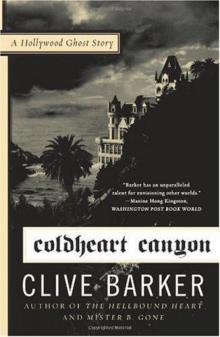 Coldheart Canyon: A Hollywood Ghost Story
Coldheart Canyon: A Hollywood Ghost Story Galilee
Galilee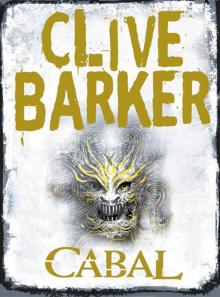 Cabal
Cabal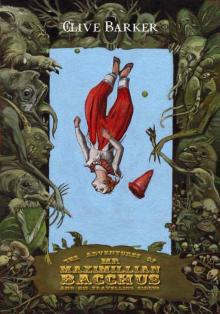 The Adventures of Mr. Maximillian Bacchus and His Travelling Circus
The Adventures of Mr. Maximillian Bacchus and His Travelling Circus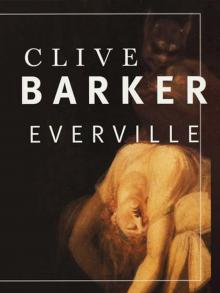 Everville
Everville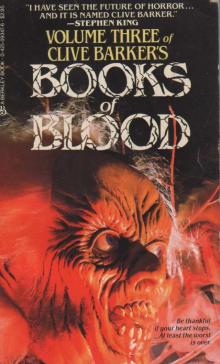 Books of Blood: Volume Three
Books of Blood: Volume Three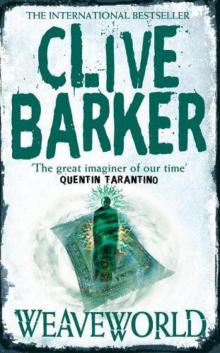 Weaveworld
Weaveworld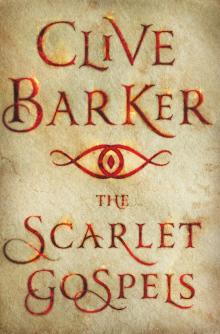 The Scarlet Gospels
The Scarlet Gospels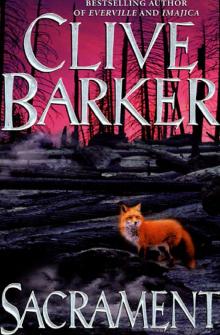 Sacrament
Sacrament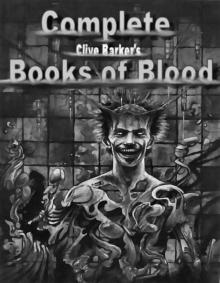 Books of Blood: Volumes 1-6
Books of Blood: Volumes 1-6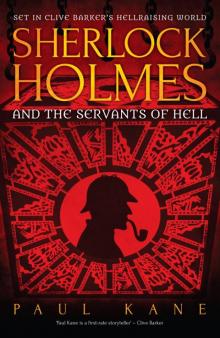 Sherlock Holmes and the Servants of Hell
Sherlock Holmes and the Servants of Hell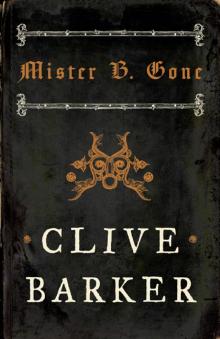 Mister B. Gone
Mister B. Gone Imajica
Imajica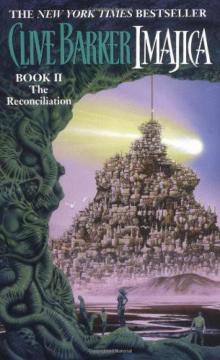 The Reconciliation
The Reconciliation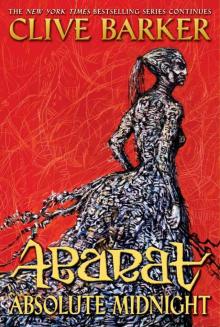 Abarat
Abarat Clive Barker's First Tales
Clive Barker's First Tales The Hellbound Heart
The Hellbound Heart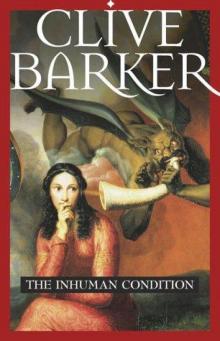 The Inhuman Condition
The Inhuman Condition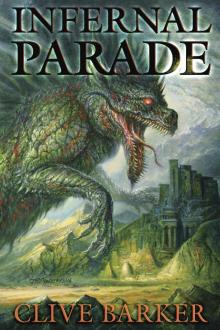 Infernal Parade
Infernal Parade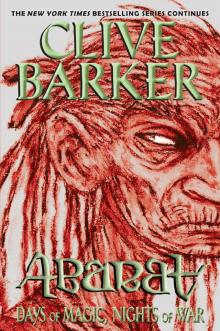 Days of Magic, Nights of War
Days of Magic, Nights of War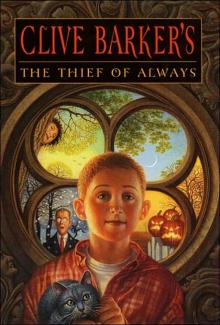 The Thief of Always
The Thief of Always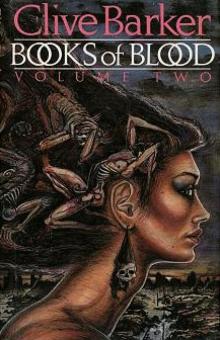 Books of Blood Vol 2
Books of Blood Vol 2 The Essential Clive Barker
The Essential Clive Barker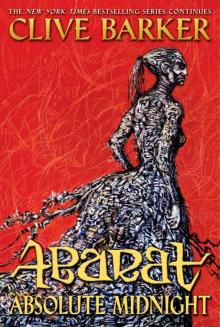 Abarat: Absolute Midnight a-3
Abarat: Absolute Midnight a-3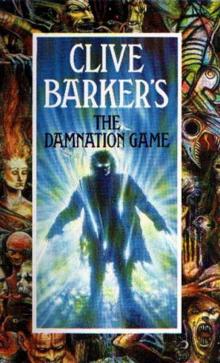 The Damnation Game
The Damnation Game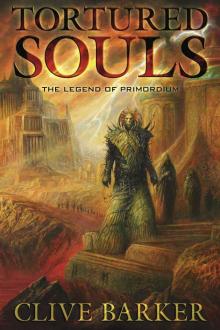 Tortured Souls: The Legend of Primordium
Tortured Souls: The Legend of Primordium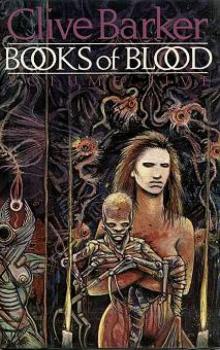 Books of Blood Vol 5
Books of Blood Vol 5 Imajica 02 - The Reconciliator
Imajica 02 - The Reconciliator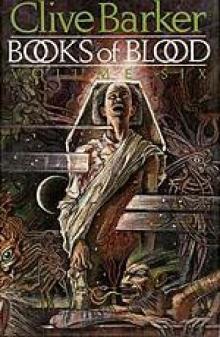 Books Of Blood Vol 6
Books Of Blood Vol 6 Imajica 01 - The Fifth Dominion
Imajica 01 - The Fifth Dominion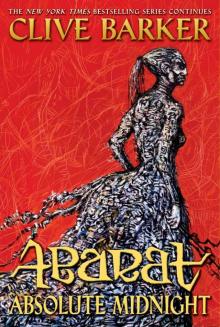 Abarat: Absolute Midnight
Abarat: Absolute Midnight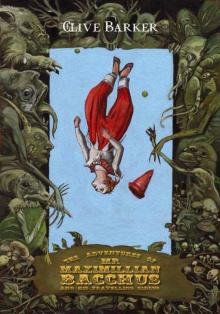 The Adventures of Mr. Maximillian Bacchus & His Traveling Circus
The Adventures of Mr. Maximillian Bacchus & His Traveling Circus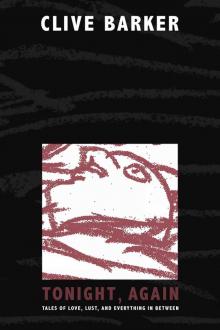 Tonight, Again
Tonight, Again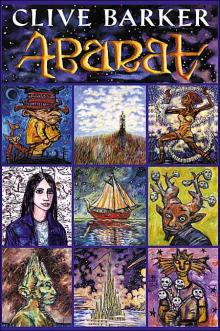 Abarat: The First Book of Hours a-1
Abarat: The First Book of Hours a-1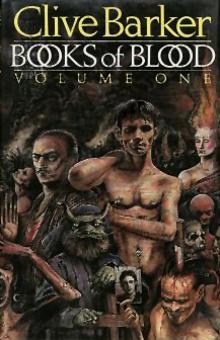 Books Of Blood Vol 1
Books Of Blood Vol 1 Age of Desire
Age of Desire Imajica: Annotated Edition
Imajica: Annotated Edition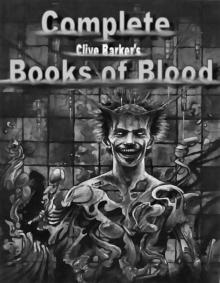 Complete Books of Blood
Complete Books of Blood Gutted: Beautiful Horror Stories
Gutted: Beautiful Horror Stories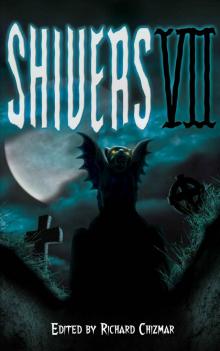 Shivers 7
Shivers 7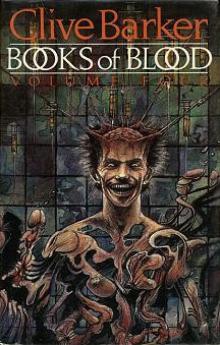 Books Of Blood Vol 4
Books Of Blood Vol 4